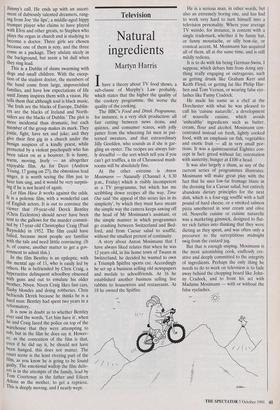Television
Natural ingredients
Martyn Harris
Ihave a theory about TV food shows, a sub-clause of Murphy's Law probably, which states that the higher the quality of the cookery programme, the worse the quality of the cooking. The BBC's Food and Drink Programme, for instance, is a very slick production: all fast cutting between news items, and quizzes, and consumer scares, with jolly patter from the wheezing fat men in pat- terned sweaters, and that extraordinary Jilly Goo!den, who sounds as if she is gar- gling an oyster. The recipes are always fair- ly dreadful — the sort which tell you if you can't get truffles, a tin of Chesswood mush- rooms will be absolutely fine.
At the other extreme is Anton Mosimann — Naturally (Channel 4, 8.30 p.m., Friday) which is risibly incompetent as a TV programme, but which has me scribbling down recipes all the way. Time Out said 'the appeal of this series lies in its simplicity', by which they must have meant the simple way the camera keeps sawing off the head of Mr Mosimann's assistant, or the simple manner in which programmes go crashing between Switzerland and Bed- ford, and from Caesar salad to soufflé, without the smallest pretext of continuity.
A story about Anton Mosimann that I have always liked relates that when he was 12 years old, in his home town of Twann in Switzerland, he decided he wanted to own a Triumph Spitfire sports car. Accordingly he set up a business selling old newspapers and medals to schoolfriends. At 16 he established another business selling live rabbits to housewives and restaurants. At 18 he owned the Spitfire. He is a serious man, in other words, but also an extremely boring one, and has had to work very hard to turn himself into a television personality. Where your average TV weirdo, for instance, is content with a single trademark, whether it be funny hat, or funny moustache, or silly bow-tie, or comical accent, M. Mosimann has acquired all of them, all at the same time, and is still mildly tedious.
It is to do with his being German-Swiss, I suppose, which debars him from doing any- thing really engaging or outrageous, such as getting drunk like Graham Kerr and Keith Floyd, or getting fat like Philip Har- ben and Tom Vernon, or wearing false eye- lashes like Fanny Cradock.
He made his name as a chef at the Dorchester with what he was pleased to call his 'cuisine naturelle', a development of nouvelle cuisine, which avoids 'unhealthy' ingredients such as butter, cream, flour and alcohol. Mosimann con- centrated instead on fresh, lightly cooked food, with an emphasis on fish, vegetables and exotic fruit — all in very small por- tions. It was a quintessential Eighties con- cept in fact: greed without fat; ostentation with austerity; hunger at 100 a head.
It was also largely a sham, as any of the current series of programmes illustrates. Mosimann will make great play with the fact that he uses low-fat fromage blanc in the dressing for a Caesar salad, but entirely abandons dietary principles for the next dish, which is a four-egg soufflé with a half pound of hard cheese, or a smoked salmon pizza smothered in sour cream and olive oil. Nouvelle cuisine or cuisine naturelle was a marketing gimmick, designed to flat- ter rich fatties into thinking that they were dieting as they spent, and was often only a precursor to the surreptitious midnight swig from the custard jug.
But that is enough sniping. Mosimann is the most astonishing cook, endlessly cre- ative and deeply committed to the integrity of ingredients. Perhaps the only thing he needs to do to work on television is to fade away behind the chopping board like John- ny Cradock, and to front his act with Madame Mosimann — with or without the false eyelashes.


















































 Previous page
Previous page